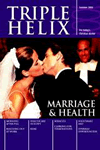Shortly after the 9/11 attackes on the twin towers of the World Trade Centre in New York and Washington's Pentagon, an American publisher released a new Bible that it billed, 'The extreme Word of God for these extreme times.' ExtremeWord is a Bible aimed at teenagers. There's a flag on the cover plus notes on war, enemies, peace and nations. 'People are turning to God during this time,' the publishers explain. 'Few people realise that God has a lot to say about attack, enemies, war, nations and leaders.'
Now I'm not sure that the ExtremeWord Bible has got things entirely right. It may not be exactly to your taste or mine. Its temper is hardly British, but it points to something that's often lacking in Christian culture here. Britain has become a place where the name of God is rarely heard in public discourse and where the hard sayings that come with a full-blooded Christian faith get toned down. The pressure applies as much to Christian doctors as anyone else.
Part of the problem is that Christians have fallen in with the enlightenment consensus that faith is essentially private, to be kept to one's self and Elijah and King Ahab (1 Kings 21:1-28) would have read if the Prophet had believed that religion was just a private matter and eschewed use of extreme words? Imagine. Verse 19b: 'This is what the Lord says: “In the place where the dogs licked up Naboth's blood, dogs will lick up your blood, yes yours” … but of course to say it that way would be somewhat intemperate.' Verse 20b: 'You have sold yourself to do evil in the sight of the Lord … but of course religion has nothing to do with public life.'
Is there a word here for Christian doctors? 'All my spiritual instincts tell me I should offer to pray with this patient … but of course that would be imposing my views.' 'I know this person could have their faith kick-started by an invitation to an Alpha course … but of course that would be intruding into someone's private life.'
Would acting on these instincts be all that extreme?
































